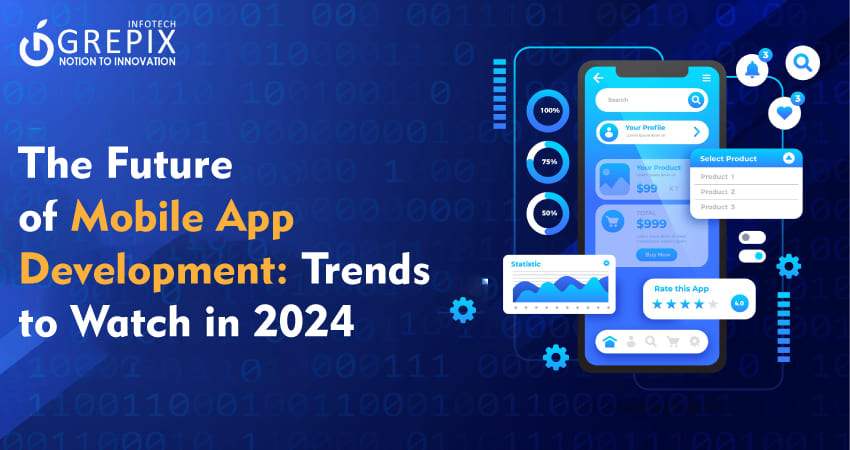The Future of Mobile App Development: Trends to Watch in 2024
The mobile app development landscape is continuously evolving, driven by technological advancements and changing user expectations. As we step into 2024, the landscape of mobile apps is poised for transformative changes, driven by emerging trends and evolving user expectations. At Grepix Infotech, we are committed to staying ahead of the curve, leveraging the latest advancements to create cutting-edge solutions for our clients. In this blog, we will explore the key trends set to redefine mobile app development in 2024, from AI integration and 5G technology to enhanced security measures and immersive user experiences. Join us as we delve into the future of mobile app development and discover how these trends can propel your business forward.
The future of mobile app development in 2024 is marked by several transformative trends. Key advancements include AI and machine learning for personalized user experiences, 5G technology for enhanced connectivity, and AR/VR for immersive interactions. IoT integration will enable seamless connectivity with smart devices, while blockchain ensures security and transparency. Progressive Web Apps (PWAs) offer cost-effective development and superior performance. Voice-activated interfaces and edge computing enhance accessibility and app performance, respectively. Wearable technology integration provides real-time health tracking and user engagement. Embracing these trends will help businesses create innovative apps that exceed user expectations.
The Future of Mobile App Development
The mobile app development landscape is continuously evolving, driven by rapid technological advancements and changing user needs. As we look to the future, several key trends and innovations are poised to shape the industry. Here are the detail given below:
1. AI and Machine Learning Integration
- Personalized User Experiences: AI and machine learning can analyze user behavior to deliver personalized content and recommendations, enhancing user engagement and satisfaction.
- Predictive Analytics: Machine learning algorithms can predict user actions and preferences, allowing apps to proactively offer solutions and improve user retention.
- Automated Customer Support: AI-powered chatbots and virtual assistants can provide instant, 24/7 customer support, improving user experience and reducing operational costs.
Also Read: "Top Innovative Ideas to Boost Your Taxi Business in 2024"
2. Augmented Reality (AR) and Virtual Reality (VR)
- Immersive Experiences: AR and VR technologies can create immersive experiences for gaming, shopping, education, and more, providing a unique and engaging user experience.
- Enhanced Visualization: AR can enhance real-world environments with digital overlays, useful in navigation, interior design, and interactive marketing.
- Remote Collaboration: VR can facilitate remote collaboration and training, enabling virtual meetings and simulations in various industries.
3. Internet of Things (IoT) Integration
- Connected Devices: IoT enables seamless connectivity between mobile apps and smart devices, enhancing functionality in smart homes, healthcare, and industrial applications.
- Real-Time Data: Mobile apps can collect and analyze real-time data from IoT devices, providing insights for predictive maintenance and improved decision-making.
- Automation and Control: IoT integration allows users to control smart devices remotely, offering convenience and efficiency in daily tasks.
4. 5G Technology
- Enhanced Connectivity: 5G technology provides faster data transfer speeds and lower latency, enabling real-time communication and high-quality streaming.
- New Opportunities: The increased bandwidth of 5G opens up new opportunities for AR/VR applications, IoT integration, and advanced mobile gaming.
- Improved User Experience: 5G’s high-speed connectivity ensures smoother performance, quicker downloads, and better overall user experience.
5.Blockchain for Security and Transparency
- Secure Transactions: Blockchain technology can enhance security in mobile payments, ensuring transparent and tamper-proof transactions.
- Data Privacy: Decentralized data storage provided by blockchain ensures user data privacy and protection against unauthorized access.
- Smart Contracts: Implementing smart contracts can automate and secure agreements, reducing the need for intermediaries and minimizing fraud.
6.Progressive Web Apps (PWAs)
- Seamless User Experience: PWAs offer a seamless user experience by combining the best features of web and mobile apps, including offline access and push notifications.
- Cost-Effective Development: Developing PWAs can be more cost-effective than creating separate native apps for different platforms.
- Improved Performance: PWAs load faster and provide a more responsive experience, enhancing user engagement and retention.
7.Voice-Activated Interfaces
- Hands-Free Interaction: Voice-activated interfaces enable hands-free interaction with mobile apps, improving accessibility and convenience for users.
- Integration with Virtual Assistants: Integration with virtual assistants like Siri, Google Assistant, and Alexa can enhance app functionality and provide a seamless user experience.
- Natural Language Processing: Advanced natural language processing (NLP) allows voice interfaces to understand and respond to user queries accurately.
8. Edge Computing
- Reduced Latency: Edge computing processes data closer to the source, reducing latency and improving app performance.
- Enhanced Security: By minimizing data transfer to central servers, edge computing enhances data security and privacy.
- Improved Scalability: Edge computing supports scalable app architectures, accommodating increasing data volumes and user demands.
9.Wearable Technology Integration
- Health and Fitness Tracking: Mobile apps integrated with wearable devices can provide real-time health and fitness tracking, offering personalized insights and recommendations.
- Enhanced User Engagement: Wearable technology enables continuous user engagement through notifications, reminders, and real-time updates.
- New Opportunities: Integration with wearable devices opens up new opportunities for innovative applications in healthcare, sports, and lifestyle.
Conclusion
The future of mobile app development is brimming with exciting possibilities. As we navigate through 2024, the future of mobile app development promises to be more dynamic and innovative than ever before. By embracing trends like AI, 5G, augmented reality, and robust security protocols, businesses can create apps that not only meet but exceed user expectations. At Grepix Infotech, we are dedicated to pioneering these advancements, ensuring our clients stay competitive in a rapidly evolving market. The trends highlighted in this blog are not just predictions but the blueprint for creating next-generation mobile applications. Partner with us to harness these trends and transform your vision into a revolutionary mobile app that drives success and sets new industry standards.
Launch your vision with our mobile app development company, where innovation meets excellence to create cutting-edge mobile solutions.








